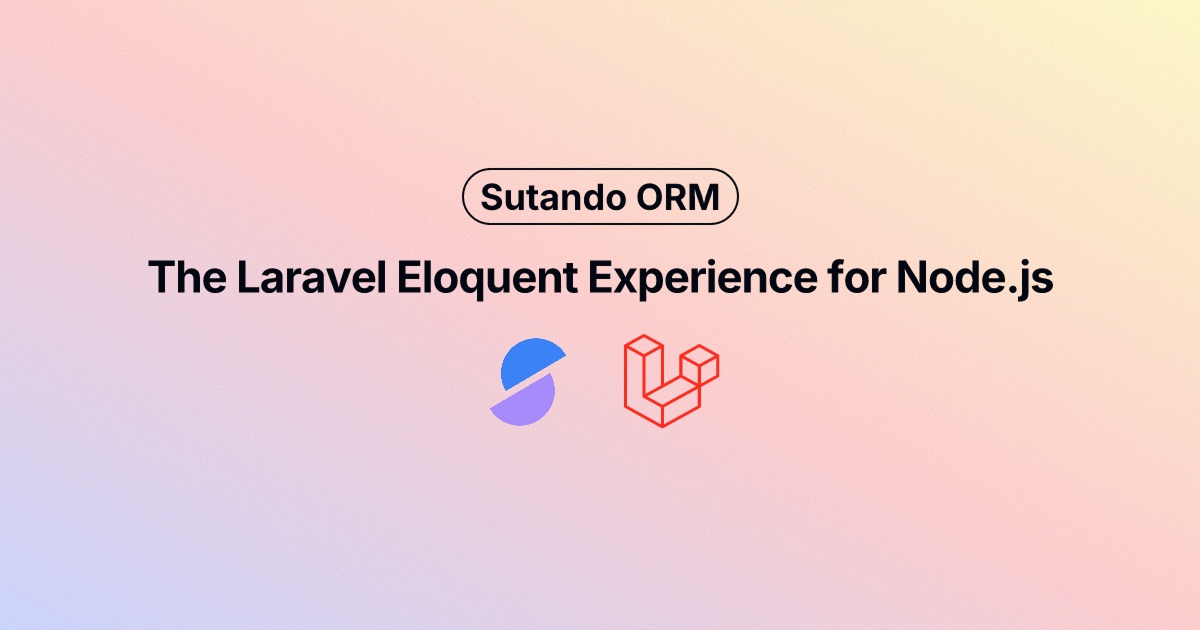
The Familiar Active‑Record You Love, Now for JavaScript
Sutando ORM speaks the same language as Laravel’s Eloquent—methods, naming, and conventions—yet runs anywhere in the Node.js ecosystem, without tying you to a full‑stack framework.
Nearly Drop‑In Compatible with Laravel Eloquent
If you’ve written an Eloquent query, you already know Sutando:
// models/User.ts
import { Model, Attribute } from 'sutando';
export class User extends Model {
table = 'users';
// cast
casts = {
metadata: 'json',
}
//
// attribute
attributeFullName() {
return Attribute.make({
get: () => {
return this.first_name + ' ' + this.last_name;
},
});
}
// relation
relationPosts() {
return this.hasMany(Post);
}
}
const users = await User.query().with('posts').get();- Identical relationship helpers (
hasMany,belongsTo,morphTo, etc.) - Chainable query builder with
where,orderBy,limit,with,has,whereHas, and more - Soft deletes, events, global scopes, and eager loading work just like in Laravel
- Migrations, factories, and seeders share the same philosophies—moving from PHP feels effortless
Framework‑Agnostic by Design—A Contrast to AdonisJS
Full‑stack solutions such as AdonisJS ship with Lucid ORM, which shines when you commit to the entire framework. Sutando takes the opposite route:
| Feature | Sutando ORM | AdonisJS Lucid |
|---|---|---|
| Framework dependency | None — plug into Express, Fastify, Next.js, Cloudflare Workers, Bun, or anything else | Tightly integrated with AdonisJS |
| Migration to existing stack | Drop‑in; no need to rewrite your server | Requires adopting AdonisJS conventions |
This decoupled approach lets you adopt Sutando gradually—add it to a legacy Express API, a React server, or even into an AdonisJS project if you prefer its API surface.
Fluent Query Builder Example
const latestActive = await User.query()
.with('posts.comments')
.where('status', 'active')
.orderBy('created_at', 'desc')
.limit(10)
.get();You read it like a sentence, just as in Laravel—no extra boilerplate, no new mental model.
Powerful Plugins & Lifecycle Hooks
Need soft deletes, multi‑tenancy, or automatic timestamps? Write it once and apply everywhere:
User.saving(async (model) => {
model.last_updated_at = new Date();
});Quick Start
npm install sutando --saveConfigure your database, create your first model, and run queries—no framework migration required. Full docs live at https://sutando.org/guide/getting-started.html.
const { sutando, Model } = require('sutando');
// Add SQL Connection Info
sutando.addConnection({
client: 'mysql2',
connection: {
host : '127.0.0.1',
port : 3306,
user : 'root',
password : '',
database : 'test'
},
});
const db = sutando.connection();
// Using The Query Builder
const users = await sutando.table('users').where('votes', '>', 100).get();
// or
const users = await db.table('users').where('votes', '>', 100).get();
// Using The Schema Builder
await sutando.schema().createTable('users', table => {
table.increments('id').primary();
table.integer('votes');
table.timestamps();
});
// Using The ORM
class User extends Model {}
const users = await User.query().where('votes', '>', 100).get();Build Faster, Stay Flexible
Sutando ORM delivers the Eloquent developer experience Laravel fans adore, yet keeps your architecture open. Whether you’re upgrading a JavaScript codebase, experimenting with serverless, or simply want an Active‑Record that feels right, Sutando is ready to power your next app—framework‑free.